This post contains affiliate links.
I could not resist making a post on Empathy card games, as it is such a fascinating trend. I hope you will share my enthusiasm for the 14 games I recommend that trigger truthful conversations and foster creativity.
Empathy card games for grown-ups and organizations comprise:
- “Thoughtful questions games” to engage meaningful conversations with family members, colleagues, neighbors, and other adults
- “Professional games” to enhance creativity, animate workshops or other gatherings
- Specialized games (for clinicians, communities…)
The following table summarizes their main characteristics. The abbreviations correspond to my recommendations (not from the game publisher):
Genre: Thougtful (Thoughtful questions) / Professional / Community (Community building) / Clinical
For: O (Organizations, companies, associations) / A (Adults) / Cl (Clinicians) / F (Families) / T (Teachers) / Th (Therapists)
| Game | Genre | Price | Players | For | Rating |
|---|---|---|---|---|---|
| The Empathy Game | Thoughtful | $$ | 2-6 | A, O | ★★★☆☆ |
| Reflexion Cards | Thoughtful | $$ | 1-6 | A, O, F, Th | ★★★★☆ |
| IceBreaker | Thoughtful | $$$ | 2‑6 | A, O | ★★★☆☆ |
| unCURATED | Thoughtful | $$$ | 2-6 | A | ★★★☆☆ |
| WNRS | Thoughtful | $$$ | 2-6 | A | ★★★☆☆ |
| Big talk | Thoughtful | $$$ | 1‑6 | A, O, T, F | ★★★★☆ |
| SoCards | Thoughtful | $$ | 1‑6 | A | ★★★★☆ |
| The Empathy Box | Professional | $$$$$ | 4‑8 | O | ★★★★☆ |
| Questions and empathy | Professional | $$$ | 2‑6 | O | ★★★☆☆ |
| We! Connect | Professional | $$$ | 2-60 | O, A | ★★★★☆ |
| Design Kit Travel Pack | Professional | $$$ | 1+ | O | ★★★★☆ |
| Edison Deck | Professional | $$$ | 1+ | A | ★★★☆☆ |
| Story Stitch | Community | $$ | T, O | ★★★★☆ | |
| The Empathy Project | Clinical | $$ | 1‑10 | Cl | ★★★☆☆ |
7 Thoughtful Questions Games for Building Empathy
In this section, I list games that work by having players ask thoughtful questions that enable players to know each other better and connect at an emotional level.
They are completely different from “Quiz” or “Trivia” games you are familiar with where you ask questions just for fun or as some knowledge test, and the answers are predefined.
On the contrary, thoughtful questions games (I coined this term as there is currently no term for this new genre) ask questions which:
- Are open: there is no set of predefined answers.
- Are personal: answers are unique to each player and relate to the player’s experience, objectives, values or emotions.
- Include “deep” questions (and often mix them with lighter questions to make the game more fun).
- Encourage creativity: some of these questions aim at making you envisage new possibilities and ideas
- Create a deeper bond between the players: they enable to know other players better by answering questions you would have never asked, and by giving you insights on how they feel and react
This new category of games has become hyped. They are sometimes marketed through Kickstarter campaigns and publishers are extremely marketing savvy. This could tip you off, but beyond the hype, there is something really happening here. Adults, not only teachers & parents with their children (see my other posts on empathy games) actually learn more about each other and develop more empathy.
The publishers sometimes advertise that they can be used from 10-Year-old and up. The reality is that starting from 14 is more realistic.
These games are generally played from 2 to 6 players, but:
- They can be played with larger groups, the problem being that each player gest to answer fewer questions, which somehow defeats the purpose
- They can sometimes be played alone. This is an interesting feature. For instance, you can use them for journaling, or when you want to be more creative or learn more about yourself.
The Empathy Game (Bispublishers)
★★★☆☆
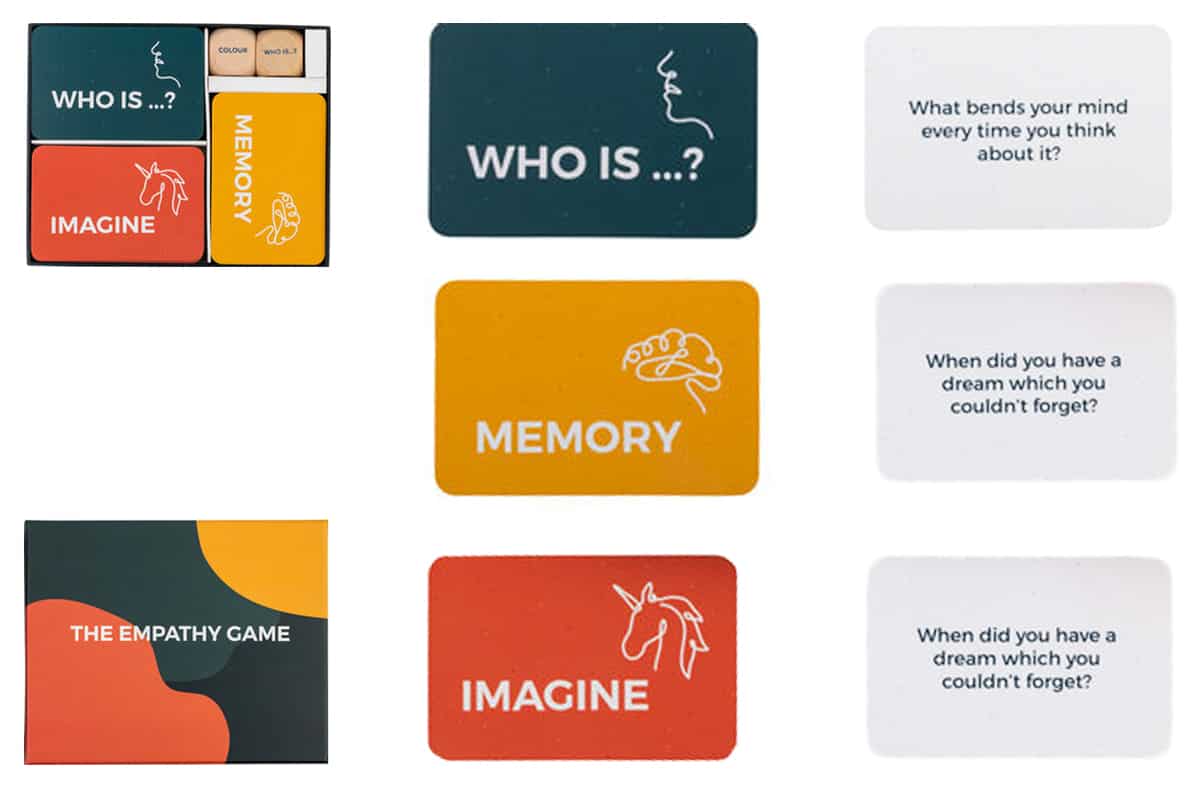
Players: 2-6
Target: Adults, Organizations
Author: Saskia Hermann, Jorik Elferink
In The Empathy Game , players draw question cards (150 cards total) in three categories (the category is determined with a category die) and have to answer them:
, players draw question cards (150 cards total) in three categories (the category is determined with a category die) and have to answer them:
- “Memory” cards require you to remember facts about yourself, for example: “What has been incredibly rewarding to do?”
- “Who is…?” cards about your tastes or interests that help understand “who you are”, for example: “What interests you that most people know little about?”
- “Imagine” cards require you to imagine what you would do, think or be in a given situation, for example, “If you could turn any activity into an Olympic sport, what would you win a gold medal for?”
An “engagement die” that is thrown after the question card has been answered. It challenges the players to engage with the answer or story, guided by one of the following categories:
- Colour of the story
- Draw the story
- Smell of the story
- Taste of the story
- Feeling of touch of the story
- Body pose that best represents the story
The strength of the game is that:
- You will learn things about others that you would have never asked.
- The questions are generally very open and enable you to answer in a light manner or more deeply, according to your mood (for example “What would you stop doing if you could?” or “What’s a life goal you’ve discarded?”).
- Reasonable price
The “engagement die” can be a bit less easy to use. It enables to go beyond the initial answer, but players might start “commenting” other player’s answers (you want absolute benevolence from everyone or players start to censor themselves), and the fact that it is based on our senses often feels strange (who knows what is the “smell” of “I have decided to abandon learning to play the guitar”?).
So I recommend The Empathy Game, especially for organizations doing for example team building or ice-breaking sessions!
Reflexion Cards (Holstee)
★★★★☆
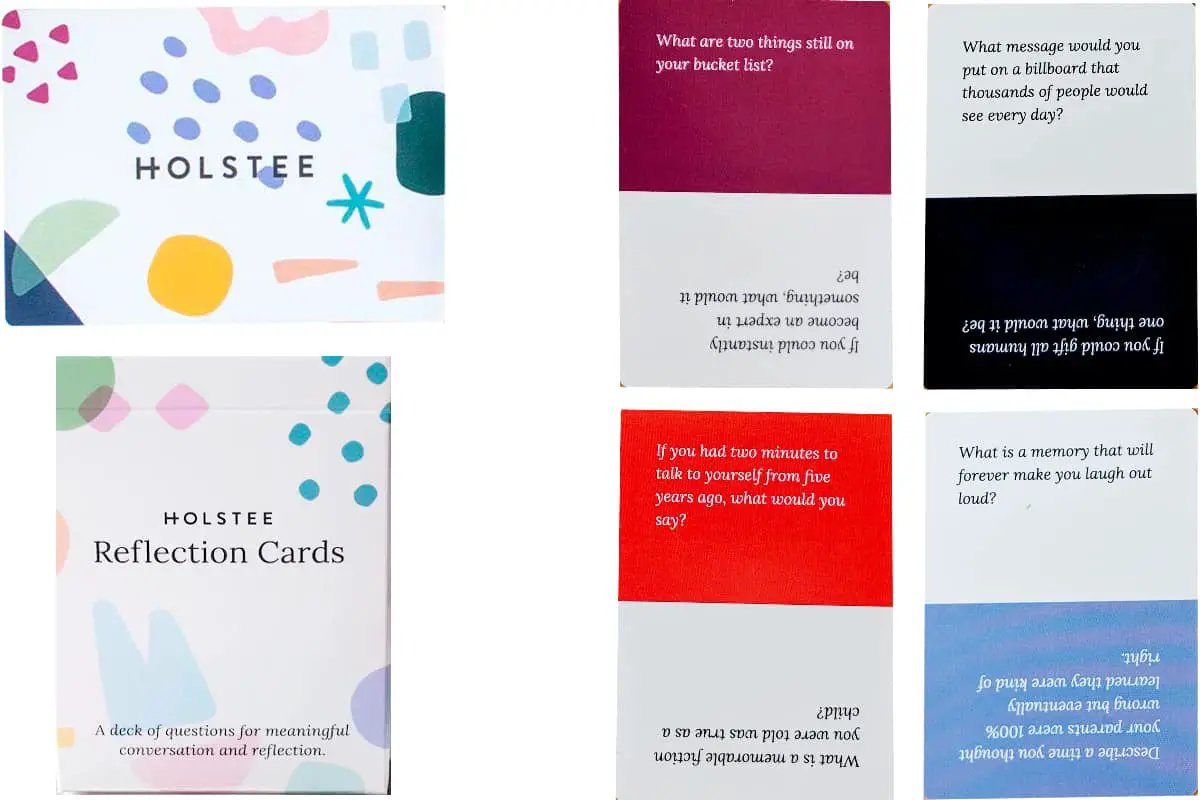
Players: 1-6
Target: Adults, Organizations, Families
A deck of Reflexion Cards contains 52 cards. Each card has two questions: a light one and a deeper one. The cards are color-coded according to 12 themes inspired by mindfulness and positive psychology:
contains 52 cards. Each card has two questions: a light one and a deeper one. The cards are color-coded according to 12 themes inspired by mindfulness and positive psychology:
- Resilience
- Gratitude, Compassion, Kinship
- Intention, Reflexion
- Wellness
- Passion, Creativity, Adventure
- Integrity, Simplicity
Here are some examples of questions to give you an idea:
- If you could gift all humans one thing, what would it be?
- How have your spiritual views changed in the last decade?
- How have you changed the past year?
- What does a perfect day look like for you?
- What made you smile today?
- What are you holding onto that you need to let go of?
The questions are more personal and less creative than the ones of The Empathy Game for example. They might feel awkward at the beginning, but they create a kind of vulnerability in each player that brings them closer. They are a good fit for playing with friends, family or by couples, but can also be used by organizations.
A strong aspect of the game is the ability to sort the question by theme – which is especially useful if you are a therapist or have a specific goal with the game.
I find that the cards are expensive though for only 52 cards, but the questions are well-chosen and the cards are really very well designed. So I really recommend Reflexion Cards by Holstee.
And here is a video by the authors who explain their game:
IceBreaker (BestSelf)
★★★☆☆
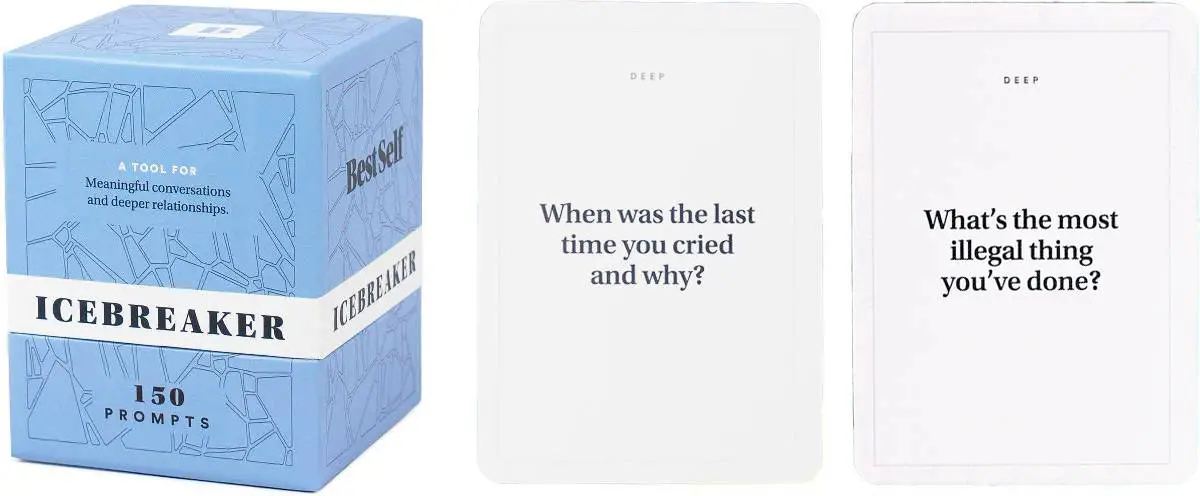
Players: 2-6
Target: Adults, Organizations
The Icebreaker Deck from BestSelf comprises 150 cards, each with one question, sorted in 6 themes, as you can see with these examples:
from BestSelf comprises 150 cards, each with one question, sorted in 6 themes, as you can see with these examples:
- Life: What’s your love language?
- Random
- Deep: What were the three biggest turning points in your life?
- Experiences
- If you could: If you could create one holiday, what would you create?
- Would you rather?: would you rather always have gas or always have bad breath?
Another difference is that the colors (for each category) are on the back of the card so that when you draw a card, you know its category beforehand. This is not a big deal though.
Another aspect is that the deck is really big with its 150 cards. It could easily have been trimmed by writing 3 questions on each card and having only 50 cards, which would have enabled to carry it everywhere.
I recommend the game, but personally I prefer the Reflexion Cards deck from Holstee (less expensive, less bulky, deeper questions, better graphic design, more portable) even though it has fewer questions overall.
The following video from BestSelf is rather informative, you might want to have a look at it if you are interested in this game:
https://www.facebook.com/BestSelfCo/videos/381126012517300/?v=381126012517300
unCURATED
★★★☆☆
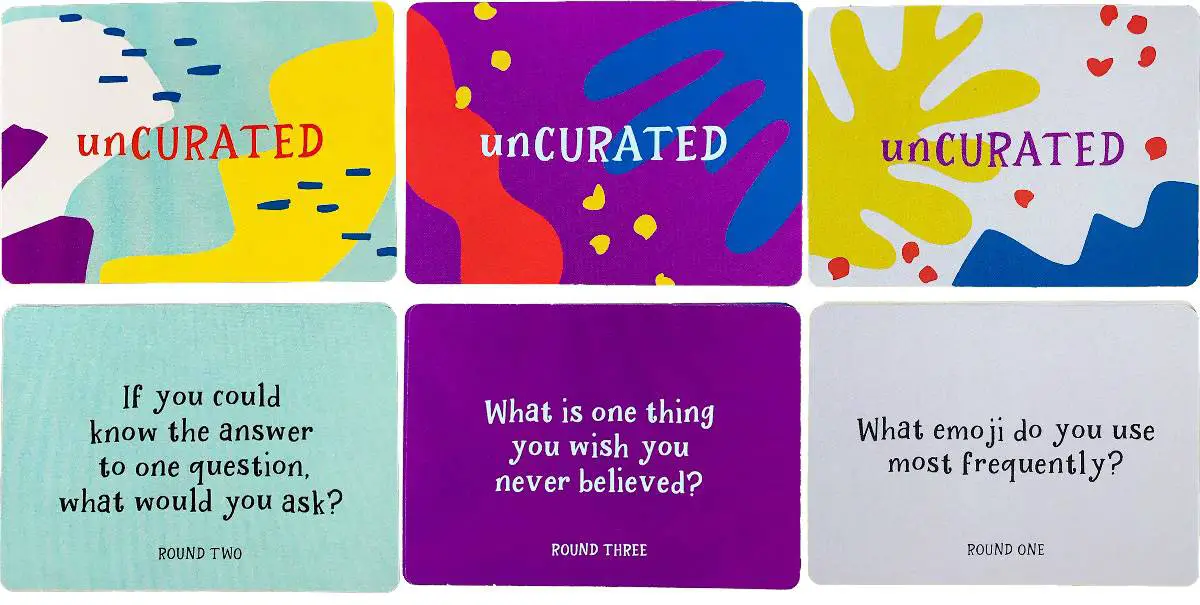
Players: 2-6
Target: Adults, Organizations
Author: Cherini Ghobrial
unCURATED is a card game that is played in three rounds, each deeper than the former round:
is a card game that is played in three rounds, each deeper than the former round:
- First round: light and easy to answer: “What emoji do you use most frequently?”
- Second round: involve more creativity and thought: “What have you discovered about yourself recently?”
- Third round: more personal and involving: “What is one thing you wish you never believed?
The idea of creating these three rounds is really good. It enables the players to start on a light tone and once they are up to speed tackle deeper questions and really learn about others and themselves. And the design is pretty. Which is why I recommend unCURATED!
WNRS – We’re Not Really Strangers
★★★☆☆
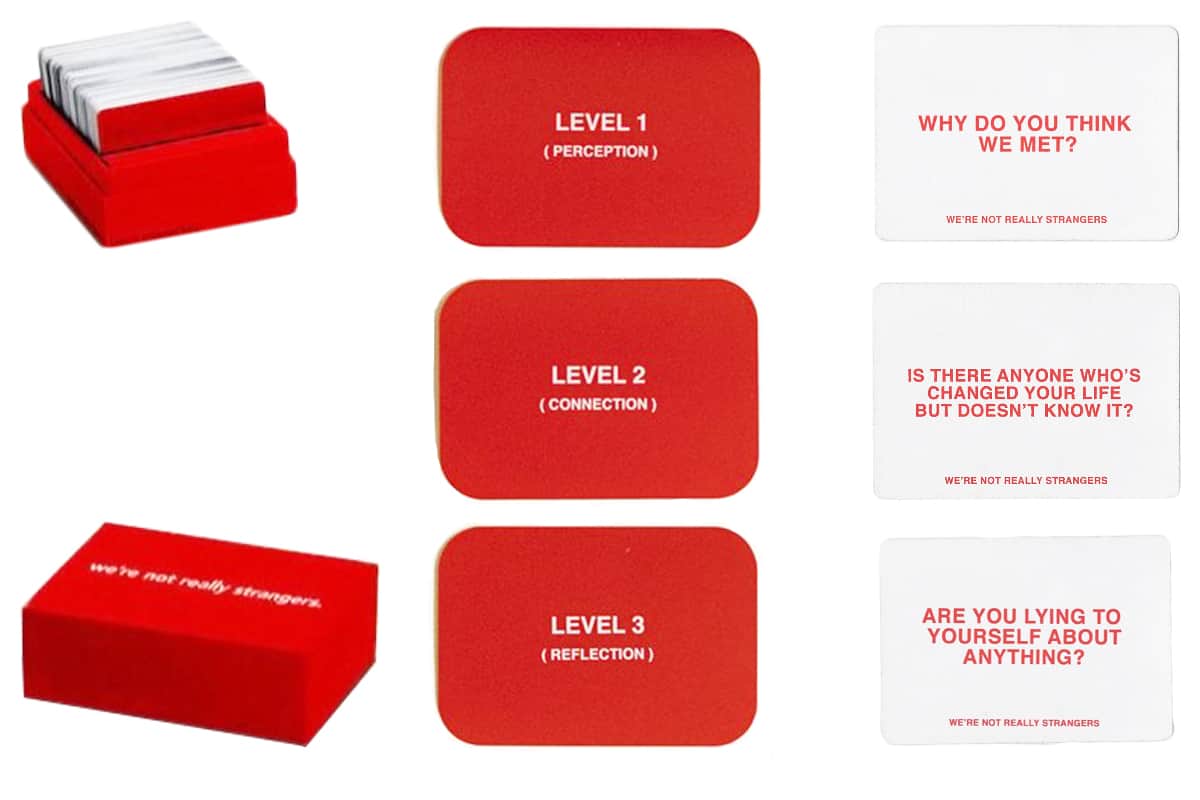
Players: 2-6
Target: Adults
Author: Koreen Odiney
The 150 question cards in We’re Not Really Strangers are sorted according to three “levels” (or categories):
- Perception: Aims at knowing what the first impression we give off and how well we read others, like “What was your first impression of me?”, or “what about me is most strange or unfamiliar to you?”
- Connection: These are really deep questions that often trigger strong emotions, like “What is the most unexplainable thing that ever happened to you?” or “What’s the most pain you’ve ever been in that wasn’t physical?”
- Reflection: “What can I teach you?”, “In a word, how would you describe our conversation?”
The game also includes some wildcards like “Draw a picture together (30 seconds)” or “Admit something”.
In the end of the game, players are prompted to write a handwritten note to other players. But you can open it only once you have parted!
Here are my feelings about WNRS.
The positive side :
- Because the questions are so deep and provocative I absolutely have to recommend WNRS if you are “courageous enough” to try. You will certainly learn a lot. These questions are really rarely asked if at all!
- The wildcards and the final handwritten note are really good ideas.
But on the flip side:
- The game goes deep very quickly, which is difficult emotionally for some people – I suggest you make clear to other players that they do not have to answer if they do not feel like to.
- The design is not attractive. I understand that the red is probably done to reinforce the provocative aspect of the questions, but unfortunately, it seems too serious, which makes it more difficult to convince other players to try it.
- It is bulky – like Icebreaker for example
This stunning video from Koreen Odiney should help you to make up your mind:
You will either perceive this game as pure genius or be repelled, I will have warned you!
Big Talk (Kalina Silverman)
★★★★☆
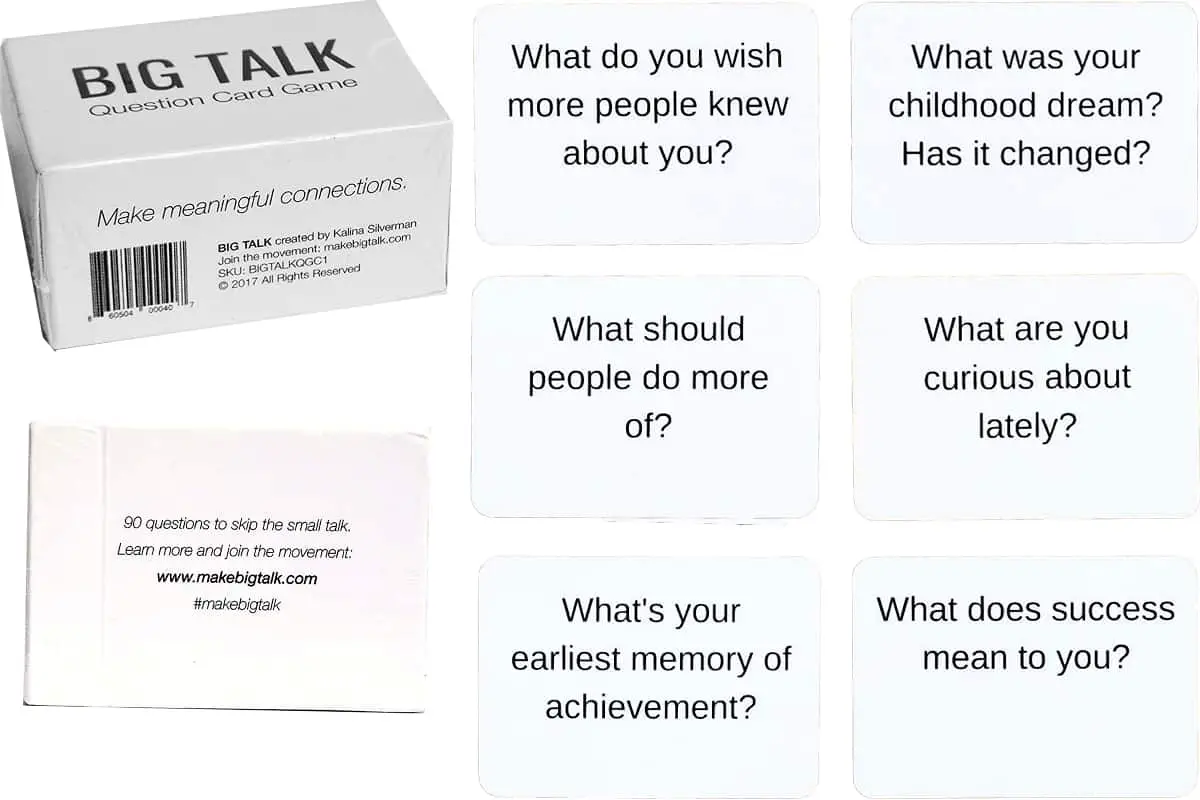
Players: 1-6
Target: Professionals, University Students, Adults
Author: Kalina Silverman
Bigtalk comprises 90 small question cards – white cards with black text in a simple white box. Despite the minimalistic design, the game is quite a phenomenon.
comprises 90 small question cards – white cards with black text in a simple white box. Despite the minimalistic design, the game is quite a phenomenon.
It started when Kalina Silverman, its author, made this video in 2014 where she asked random strangers the question “What do you want to do before you die?“.
The video went viral, which inspired her to build a global social impact initiative around meaningful communication. BigTalk events have been since organized globally and led to the creation of the card game itself.
You can watch this 2016 TEDx talk from Kalina Silverman that has gathered more than 6 million views since.
The game is a set of universal & meaningful questions (not sorted in any way), for example:
- What do you wish you knew?
- Do you want your children (if you have any) to be like you?
- What is your number one priority today?
- Where would you like to wake up tomorrow?
- What are you thankful for this very moment?
- If you could talk to everyone in the world, what would you say?
- Describe something you achieved that you didn’t think was possible.
- What makes you feel most alive?
- What do you fear?
- What do you want to do before you die?
There is no attempt in the game to build progressivity by starting with light questions. But the questions, while being deep, are not too emotionally threatening (like with WNRS), and are not complex questions either.
They really are :
- A conversation starter with strangers
- Questions you can also ask people you know
- Applicable with people of various ages, from teens to seniors.
- Usable at home, high school or university, in business events, etc..
This universality is why I love BigTalk and completely recommend it, even if it is expensive for a set of 90 small white cards.
Note: There was recently an indiegogo campaign with a game called BigTalk that seemed very innovative. The campaign was canceled and the backers reimbursed… probably because the founders realized that they were infringing on the copyright of the already existing BigTalk game.
If you want to create a game, my advice is to be mindful about how you call it! It is not so easy to create a relevant name that has not yet been used.
SoCards
★★★★☆
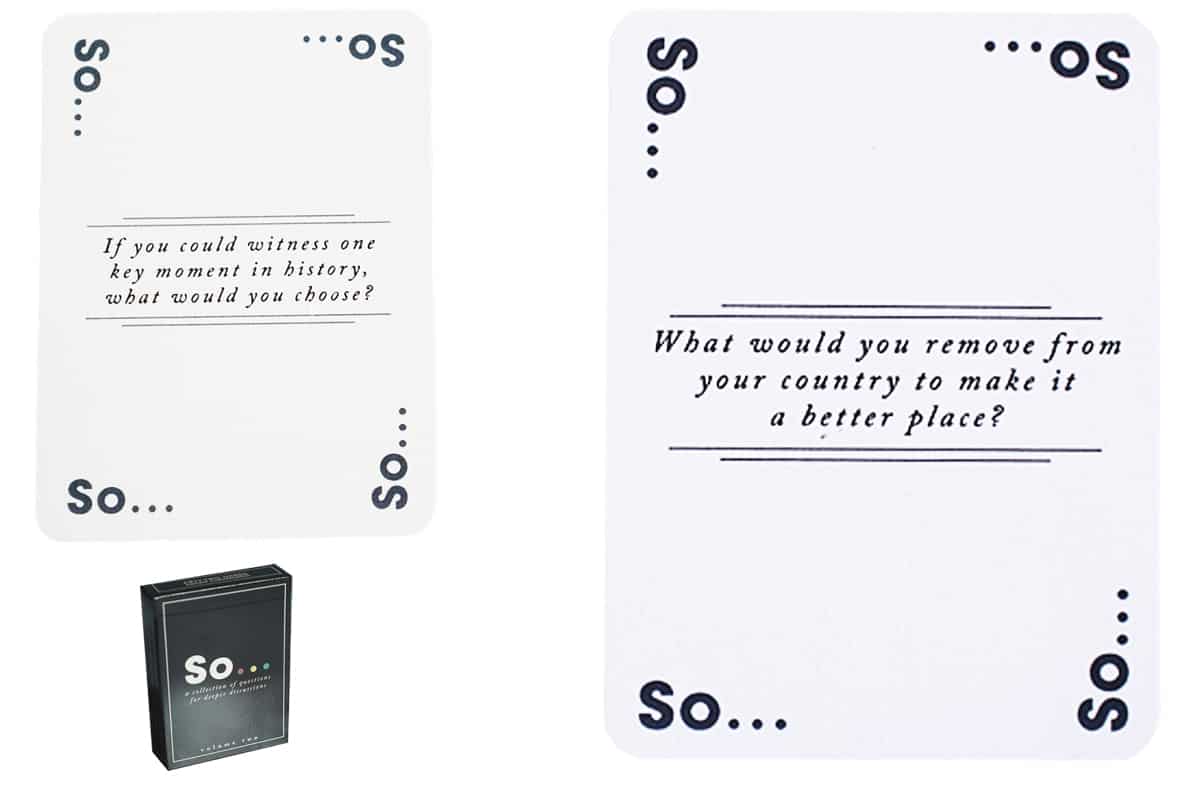
Target: Adults
Author: Miguel Luis
SoCards is a deck of 52 cards (each with a question). There is also a second deck called “more than friends” which is meant to be played with your partner or spouse. Here I will comment only on the standard game.
is a deck of 52 cards (each with a question). There is also a second deck called “more than friends” which is meant to be played with your partner or spouse. Here I will comment only on the standard game.
Here are some example questions:
- If you could witness one key moment in history, what would you choose?
- What’s a common trait shared by everyone you’ve dated?
- If you could punch anyone in the face without repercussions, who would it be?
- What must a city have to be a good place to live in?
- How do you spend your nights when you can’t sleep?
As you can see the questions are not too emotionally engaging, but they easily trigger interesting conversations (and are designed to do so) which themselves can end up being at a deeper level.
Miguel Luis, the author of the game, presents it as a conversation starter rather than a game about empathy and connection, but the truth is that it does present an indirect and clever way to connect.
8 ways to play are proposed. they add even more versatility to this question game (here I only outline the basic principle behind 6 of the rules):
- (competitive) Everyone answers the same question, the person with the best answer wins the card.
- Players take turns picking a question and answering it.
- (alone) Use the questions for inspiration journaling, vlogging or for personal reflection.
- (empathic) A player picks a card. The others answer the question as if they were this player. The person closest to the truth wins.
- Answer as many questions as you can, as fast as possible.
- All players place at once a card they want to be answered in the middle of the table. The player who puts the top card answers the bottom card’s question…
I really recommend SoCards. This is another one with a minimalistic design, but it has many qualities. You can watch this video to have an idea:
5 Empathy Building and Creativity Card games For Organizations
The Empathy Box (Tribeless)
★★★★☆
Players: 2 to 8
Target: Organizations
Author: Gwen Yi
The Empathy Box by Tribeless is really a unique game. It is a facilitation tool aimed at small teams (best for 4 to 8 people, but it can be used with two or three people), which uses a set of very well designed cards. The following post on Medium tells the story of how the game was designed and launched and also explains the game in more detail than the product website!
on Medium tells the story of how the game was designed and launched and also explains the game in more detail than the product website!
One of the players is the storyteller. Using context, opener, scenario and closer cards, he tells a story about something that is important for him or her (and for which there is agreement that they can talk about it). The other players then have to react by using the response cards and respecting their spirit. The whole system creates a safe environment for handling difficult conversations.
Here are some example of the cards for the storyteller:
- Context: “confidence”, “anxiety”, “sacrifice”…
- Opener: “What’s the first thing that comes to mind from your word?”
- Scenario: “Holds true to you”
- Closer: “What are you leaving with today?”
And of the response cards:
- Show some love: empathy, resonance, appreciation
- Help me understand: questions, assumptions, implications
- Share an observation: actions, behavior, character
- Offer an alternate perspective: reframe, perception, interpretation
To me the game has two core strengths that make it quite unique:
- It guides the participants to create structure in the communication, and at the same time frames their behaviors to ensure they are appropriate.
- The system of stories ensures to focus on experiences rather than on opinions. Opinions or beliefs do not change easily and are detrimental to true communication – on the contrary experiences are human facts and are not invasive or harmful.
Plus the game is comprehensive, with a complete user manual for the facilitator and easy references for participants, access to a community forum, etc…
I highly recommend The Empathy Box from Tribeless, especially for communities and counselors.
Questions and Empathy (Sub Rosa)
★★★☆☆
Players: 2-6
Target: Organizations
Questions and Empathy is a beautiful 56 cards game created by the Sub Rosa
is a beautiful 56 cards game created by the Sub Rosa Brand Strategy and Design Studio.
Brand Strategy and Design Studio.
The aim of the cards if to facilitate empathic and creative design with customers – especially by enabling discussions that might be difficult otherwise. But they can be used also for team building, or in personal relationships as they are very general and rather non-threatening.
The cards belong to seven groups that correspond to different approaches to empathy: Sage, Convener, Seeker, Confidant, Inquirer, Cultivator (taken from the “Applied Empathy” approach pioneered by Sub Rosa).
Here are two examples of the cards:
- What makes an experience meaningful?
- Who inspires a sense of adventure within you?
We! Connect (We and Me)
★★★★☆
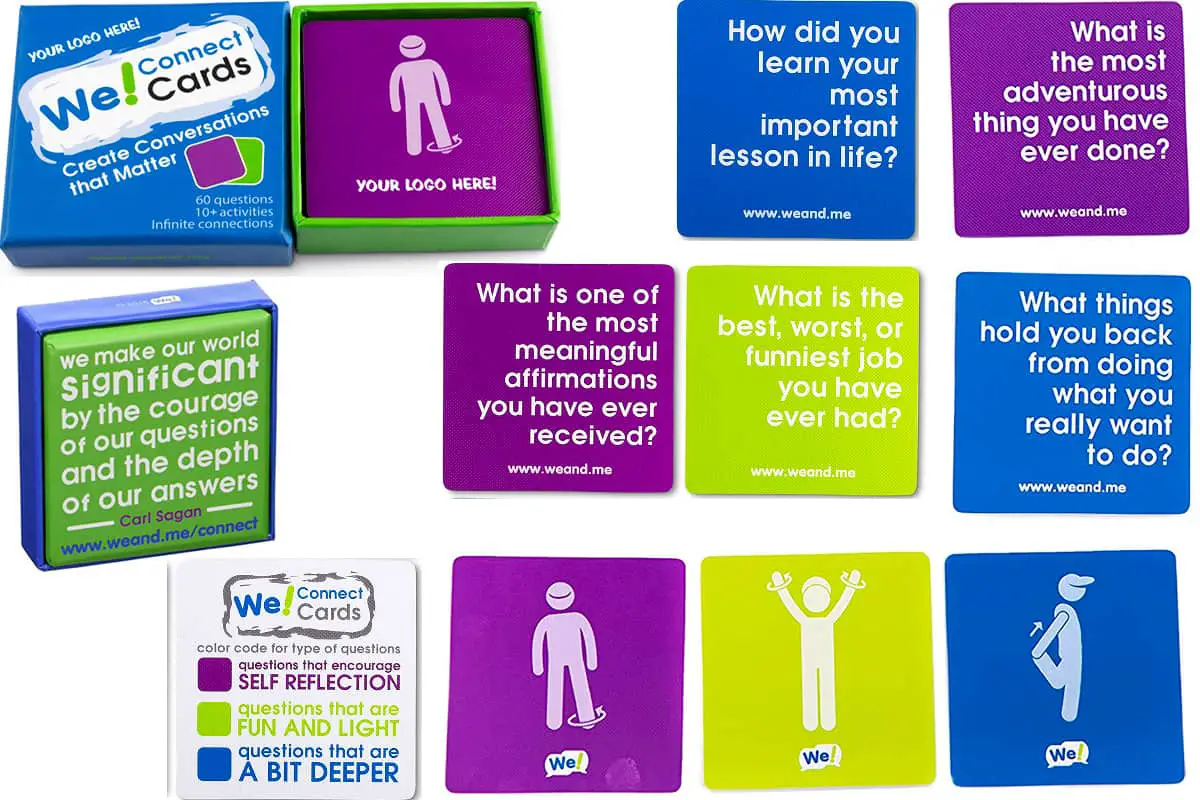
Players: 2 to 60
Target: Organizations (companies, …)
We! Connect cards are meant for meetings, gatherings or trainings where they enable to introduce moments of deeper than usual ice-breaking times.
are meant for meetings, gatherings or trainings where they enable to introduce moments of deeper than usual ice-breaking times.
The principle of the game is to swap cards: each player has a card and walks to find another player. They ask each other their question and exchange cards.
This principle is of course universal. You can use it with almost any of the games on this post! But it is also a very good approach, as you can use it with as many players as there are cards on your deck, and the random swapping between players means that you will get to know a lot of people in a short amount of time.
The 60 cards are divided into:
- 20 green cards: fun and light questions
- 20 blue cards: deeper questions
- 20 purple cards: self-reflection cards
This division into three groups of cards also enables:
- The facilitator to create lighter or deeper moments
- To let the participants draw cards in the deck they prefer to exchange the card they are supposed to answer with one they are more in the mood to answer.
So I highly recommend We! Connect wich is really a well designed corporate game.
Design Kit Travel Pack (IDEO.ORG)
★★★★☆
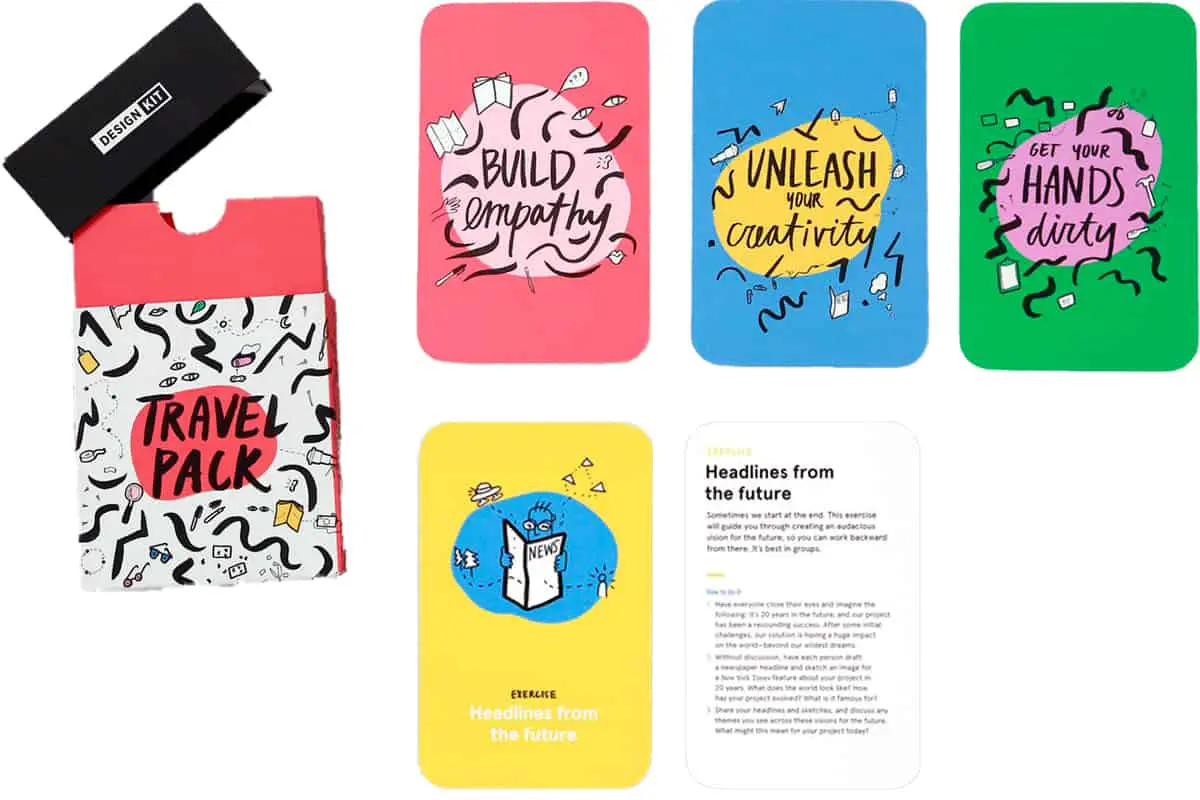
Players: 1+
Target: Engineers, Designers, Founders of companies or other organizations
The Design Travel Kit from IDEO.org is a set of 32 flashcards. It was first launched with a quite successful Kickstarter campaign
is a set of 32 flashcards. It was first launched with a quite successful Kickstarter campaign .
.
Each Flashcard exposes a universal design principle and a practical exercise inspired by the design Kit made by ideo.org. The cards are divided into three groups:
- Get inspired
- Take creative risks
- Test ideas
They can be used to:
- Understand the needs of your users
- Set goals
- Learn how to collaborate with a new team
- Be more creative
- Test and iterate based on user feedback
I am an engineer and have practiced design and innovation on new products for a long time, which makes me particularly open to this great approach to design proposed by ideo.org. I particularly recommend it for new projects where the market is yet unknown, and new teams comprised of people who do not know each other very well yet. These circumstances are very conducive to creativity, but human-centered and useful creativity is not easy and can be facilitated by this approach. I highly recommend the Design Travel Kit if you are the right target for it.
The following video does not say much about the game itself and is a bit too “salesy” for my taste, but you get to know the organization that has created it:
Edison Deck (BestSelf)
★★★☆☆
Players: 1+
Target: Professionals
Another game aimed at boosting creativity is the Edison Deck by BestSelf . This deck comprises 150 cards. Each card has a list of 10 principles or questions on each card. The principle is to use these cards along the day to prompt creative moments. They can be used for any type of creative activity like writing a book or any type of content, creating a product or a business, etc…
. This deck comprises 150 cards. Each card has a list of 10 principles or questions on each card. The principle is to use these cards along the day to prompt creative moments. They can be used for any type of creative activity like writing a book or any type of content, creating a product or a business, etc…
Some examples of cards are:
- 10 things you could start a podcast about
- 10 things you’ve always wanted to know but never asked
- 10 products you bought and loved
- 10 recent moments of happiness in your life…
I find that although these lists seem a bit superficial, they do introduce randomness in your thought process and prompt you to reflect on your life, which does result in triggering more ideas. I recommend this game for personal use (1 player) rather than for groups.
Empathy Card Games to Empathize With Other Communities
Story Stitch (Green Card Voices)
★★★★☆
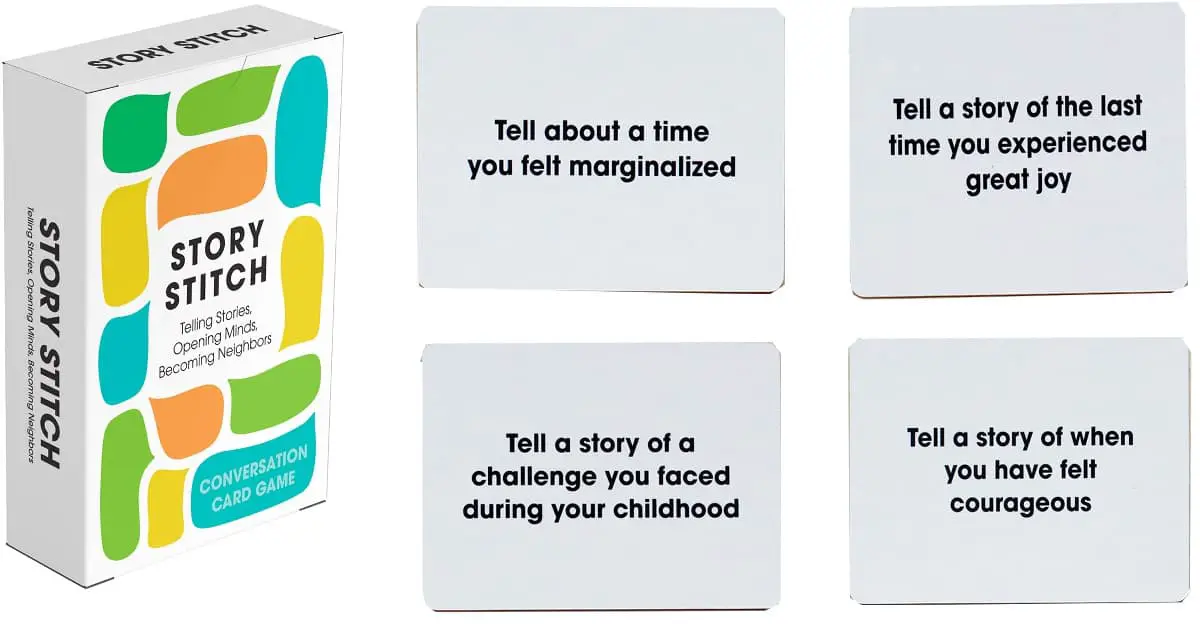
Age: 10+
Target: Teachers, Associations, Organizations
Story Stitch is a deck of 55 cards that have been designed to facilitate communication between immigrants or refugees and their new neighbors. The game makes participants tell their stories in an organized and empathic way. This helps alleviate cultural bias, and understand the often difficult situations some immigrants have endured to arrive in their host country.
is a deck of 55 cards that have been designed to facilitate communication between immigrants or refugees and their new neighbors. The game makes participants tell their stories in an organized and empathic way. This helps alleviate cultural bias, and understand the often difficult situations some immigrants have endured to arrive in their host country.
The game is not complex and can be played in classrooms, where newly arrived immigrants often feel helpless and need to be accepted and understood by the other children.
The questions are designed to be both personal and cultural, and the game mechanism allows not only for answering questions but also for creating a discussion, thanks to:
- Story Cards that are questions that trigger stories
- Stitch Cards to play to start a conversation after a question has been answered
I highly recommend Story Stich which is an excellent game.
Empathy Card Games for Clinicians
The Empathy Project (The Game Crafter)
★★★☆☆
Age: 12+
Target: Clinicians
The Empathy Project is a 30 card game designed to improve the competence of professional caregivers by enabling them to better understand patients and their families. It is based on empathy statements based on the principles described by VITALtalk.org
is a 30 card game designed to improve the competence of professional caregivers by enabling them to better understand patients and their families. It is based on empathy statements based on the principles described by VITALtalk.org , an organization that trains clinicians to be better communicators when their patients face serious illnesses.
, an organization that trains clinicians to be better communicators when their patients face serious illnesses.
I find this a great initiative as adequately communicating in such difficult circumstances is a daunting task for clinicians who have not been initially trained to be psychologists but “just” to treat illnesses, and have to deal daily with the pain and suffering of patients and families.
Edudingo.com is a participant in the Amazon Services LLC Associates Program, an affiliate advertising program designed to provide a means for sites to earn advertising fees by advertising and linking to Amazon.com. We also participate in other affiliate programs which compensate us for referring traffic.
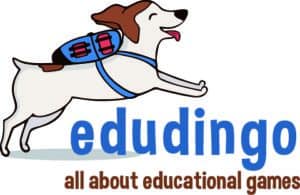
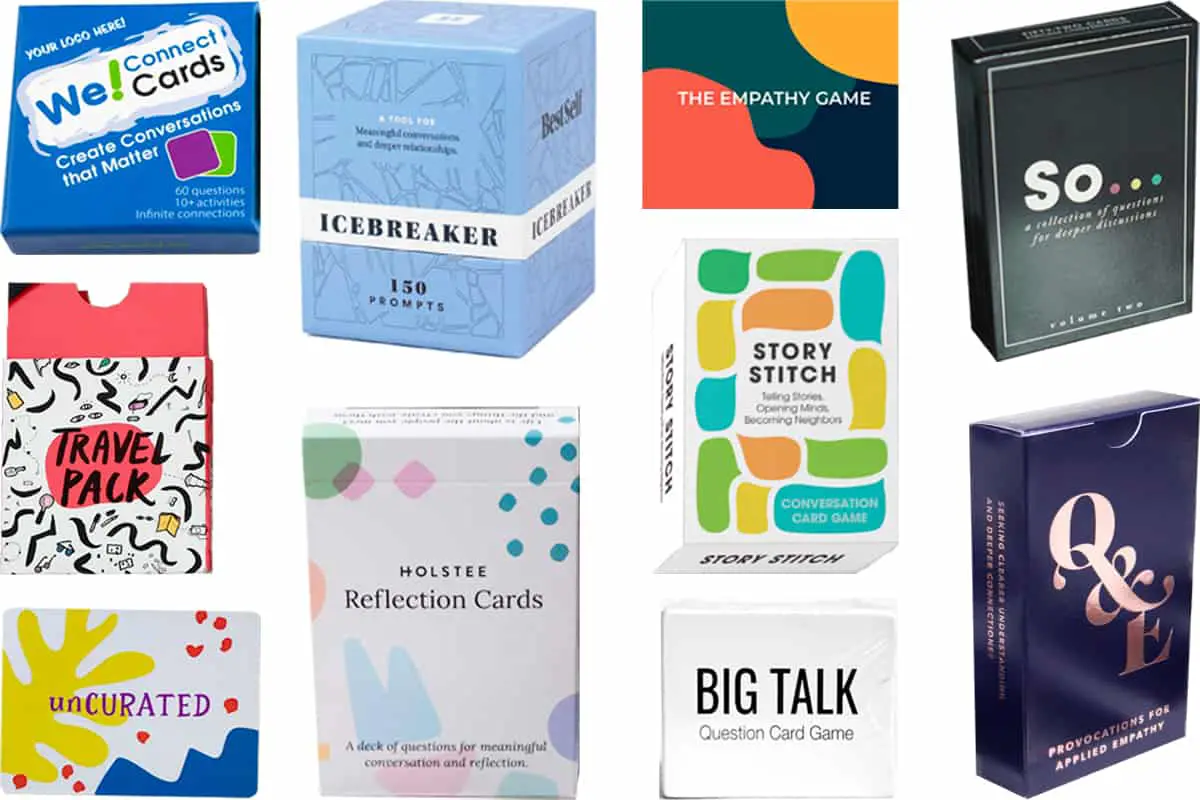

Hi there! Thank you so much for your kind and
glowing review of Big Talk. 🙂 – Kalina
P.S. Would appreciate any suggestions or insights you might have for a second updated version!
Hi Kalina
Thank you for your comment, I really appreciate it. It was really a pleasure for me to discover Big Talk.
It is great to know that you want to create an second version of Big Talk, drawing from your experience. I will be very happy to contribute if you feel I can be helpful.
I can be joined at francois@aritma.net
Kind regards
François
I am really amazed by your idea of deeper conversation.It change my way to look at things
Hi François! Thank you so much for your kind words about The Empathy Box. I can’t believe I just only came across your website 😀 Sending you lots of hugs from our team in Malaysia!
Love,
Gwen
www.empathybox.co
Hi Gwen,
Thank you for your comment.
Tribeless rocks!
Kind regards